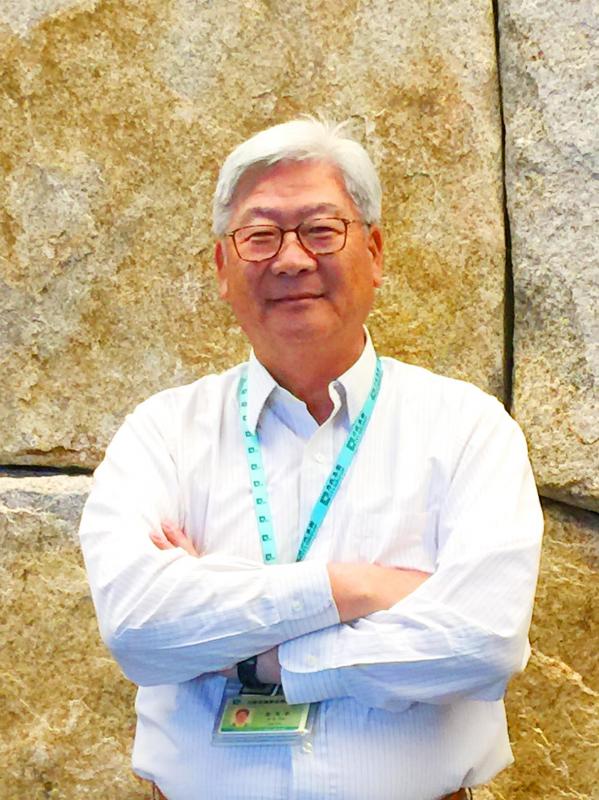Powertech Technology Inc (力成科技) yesterday said the COVID-19 pandemic would not be an obstacle to it making a record-high revenue this year, after posting its strongest first-quarter net profits in about nine years amid robust solid-state-disk (SSD) demand.
The Hsinchu-based memorychip packager and tester said most of its factories in Taiwan, China and Japan have been operating normally, unaffected by the outbreak.
“We still hold an optimistic and positive view about the second quarter. Local governments have reined in the spread of the pandemic, allowing Powertech’s fabs to operate smoothly,” chairman D.K. Tsai (蔡篤恭) told investors.

Photo: Hung Yu-fang, Taipei Times
“Some might be worried about the impact of [high] inventory [amid concern over supply disruptions last quarter], but we are seeing strong customer demand for the third and fourth quarters,” Tsai said. “We believe Powertech’s [revenue] will climb to a historical high this year, unfazed by COVID-19.”
Its confidence is also built on healthy fundamentals, as 5G-related applications, such as smartphones and 5G-enabled infrastructure and networking devices, are to fuel growth, the firm said.
Work-from-home, e-learning, e-commerce and game consoles are also stimulating demand for data centers, PCs and memory chips used in those devices, it said.
Powertech expects “a positive growth in revenue for the second quarter,” president Hung Chia-yu said.
Its DRAM business is expected to outgrow that of NAND flash memory, benefiting from launches of new smartphones and high-speed graphics, and ongoing momentum from notebook computers and data centers, he said.
Demand for system-in-package (SiP) modules has also been strong, driven by increasing consumption of SSD storage for data centers, he said.
Powertech is adding capacity this year after its loading rate climbed to 95 percent last quarter, Hung said.
Overall, loading rate for packaging services is expected to rise to as high as 85 percent this quarter, from 80 percent last quarter, he said.
Net profit jumped to NT$1.63 billion (US$54.15 million) in the first quarter, compared with NT$1.05 billion in the same period last year, marking the best first-quarter in about nine years.
On a quarterly basis, net profit dipped 21.6 percent from NT$2.01 billion, which was an all-time high.
Earnings per share rose to NT$2.1 from NT$1.36 a year ago, but down from NT$2.68 in the previous quarter.
The pandemic has delayed construction on its first panel-based packaging fab in Hsinchu by one to two quarters, but it still aims to complete construction in the fourth quarter this year, paving the way for small-volume production in the second half of next year as scheduled, Powertech said.

NEW IDENTITY: Known for its software, India has expanded into hardware, with its semiconductor industry growing from US$38bn in 2023 to US$45bn to US$50bn India on Saturday inaugurated its first semiconductor assembly and test facility, a milestone in the government’s push to reduce dependence on foreign chipmakers and stake a claim in a sector dominated by China. Indian Prime Minister Narendra Modi opened US firm Micron Technology Inc’s semiconductor assembly, test and packaging unit in his home state of Gujarat, hailing the “dawn of a new era” for India’s technology ambitions. “When young Indians look back in the future, they will see this decade as the turning point in our tech future,” Modi told the event, which was broadcast on his YouTube channel. The plant would convert

‘SEISMIC SHIFT’: The researcher forecast there would be about 1.1 billion mobile shipments this year, down from 1.26 billion the prior year and erasing years of gains The global smartphone market is expected to contract 12.9 percent this year due to the unprecedented memorychip shortage, marking “a crisis like no other,” researcher International Data Corp (IDC) said. The new forecast, a dramatic revision down from earlier estimates, gives the latest accounting of the ongoing memory crunch that is affecting every corner of the electronics industry. The demand for advanced memory to power artificial intelligence (AI) tasks has drained global supply until well into next year and jeopardizes the business model of many smartphone makers. IDC forecast about 1.1 billion mobile shipments this year, down from 1.26 billion the prior

People stand in a Pokemon store in Tokyo on Thursday. One of the world highest-grossing franchises is celebrated its 30th anniversary yesterday.

Zimbabwe’s ban on raw lithium exports is forcing Chinese miners to rethink their strategy, speeding up plans to process the metal locally instead of shipping it to China’s vast rechargeable battery industry. The country is Africa’s largest lithium producer and has one of the world’s largest reserves, according to the US Geological Survey (USGS). Zimbabwe already banned the export of lithium ore in 2022 and last year announced it would halt exports of lithium concentrates from January next year. However, on Wednesday it imposed the ban with immediate effect, leaving unclear what the lithium mining sector would do in the